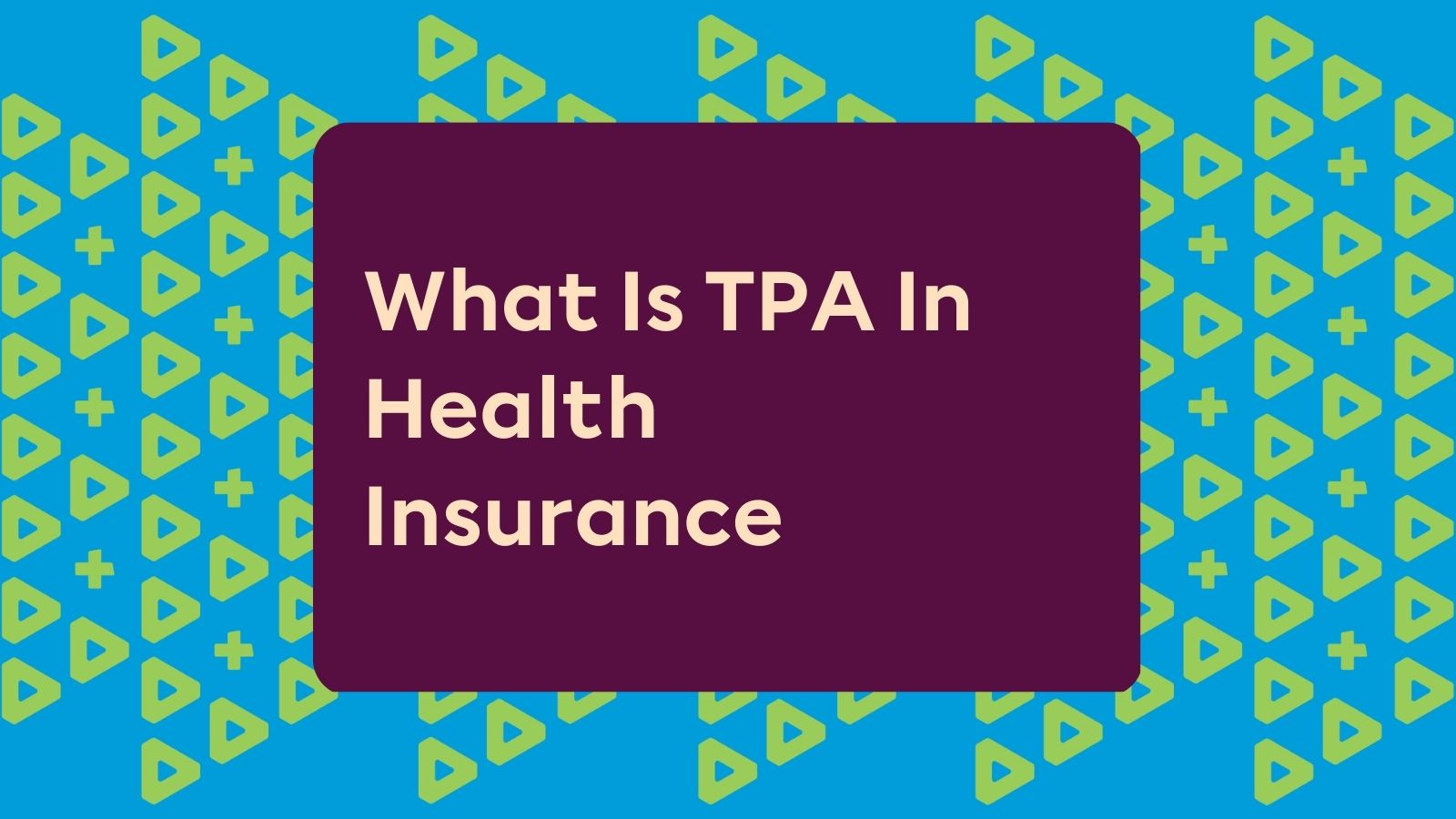

Finance
What Is TPA Insurance?
Modified: December 30, 2023
Learn what TPA insurance is and how it can benefit your finances. Discover how this type of insurance can provide financial protection and assistance.
(Many of the links in this article redirect to a specific reviewed product. Your purchase of these products through affiliate links helps to generate commission for LiveWell, at no extra cost. Learn more)
Table of Contents
Introduction
Welcome to the world of insurance! Whether you’re a business owner, a healthcare provider, or an individual seeking coverage, understanding the different types of insurance options available is crucial. Today, we’ll be diving into the topic of Third Party Administrator (TPA) insurance and shedding light on what it is, how it works, and the benefits it offers.
TPA insurance is a term that often pops up in the realm of healthcare and employee benefits. It serves as a critical link between insurance companies, employers, and policyholders, offering essential services that streamline the administration of insurance plans. This ensures smooth communication, timely claim processing, and efficient handling of medical and financial matters.
In this article, we will explore the ins and outs of TPA insurance, demystifying its functions and highlighting the advantages it brings to the table. Moreover, we’ll discuss the limitations of TPA insurance and offer insights into how to choose the right TPA insurance provider for your needs.
So, let’s roll up our sleeves and delve into the world of TPA insurance, understanding its significance and the impact it can have on your insurance experience.
Definition of TPA Insurance
TPA insurance, or Third Party Administrator insurance, refers to a specialized service provider that handles the administrative tasks related to insurance plans on behalf of insurance companies, employers, or self-funded groups. A TPA acts as an intermediary between the policyholder and the insurance company, facilitating the smooth operation of various insurance processes.
TPA insurance providers offer a range of services, including claims processing, policy administration, premium collection, customer service, and provider network management. They serve as a liaison between the policyholder and the insurance company, ensuring that all parties involved have a seamless experience when it comes to managing insurance policies.
TPA insurance is commonly utilized in the healthcare industry, where medical billings and claims can often be complex and time-consuming. By outsourcing these administrative tasks to a TPA, insurance companies and employers can focus on their core responsibilities, while still ensuring that policies are managed efficiently and effectively.
TPAs play a crucial role in managing and coordinating various aspects of insurance plans. They work closely with healthcare providers, policyholders, and insurance companies to ensure accurate documentation, efficient claim processing, and timely reimbursements. Additionally, TPAs often maintain extensive networks of medical professionals and service providers, enabling policyholders to access a wide range of healthcare options.
Overall, TPA insurance provides an essential service in the insurance industry, helping to streamline and simplify the administrative tasks associated with managing insurance plans. By entrusting these responsibilities to a specialized TPA, insurance companies, employers, and policyholders can experience smoother processes, better customer service, and more efficient management of their insurance policies.
How TPA Insurance Works
To understand how TPA insurance works, it’s important to grasp the key steps involved in the process. Here’s a breakdown of the typical workflow:
- Policy Administration: When an individual or employer purchases an insurance policy, the TPA takes over the responsibility of administering the policy. This includes managing the policyholder’s information, policy documents, and premium payments.
- Claims Processing: One of the core functions of a TPA is to handle claims processing. When a policyholder seeks medical treatment or any covered service, they submit a claim to the TPA. The TPA reviews the claim, verifies its validity, and processes the payment or reimbursement accordingly.
- Provider Network Management: TPAs often maintain networks of healthcare providers, ensuring that policyholders have access to a wide range of medical services. They negotiate contracts with these providers, establish fee schedules, and coordinate the network’s utilization to ensure cost-effective and quality care for policyholders.
- Customer Service: TPAs serve as the primary point of contact for policyholders in terms of inquiries, clarifications, and issue resolution. They provide customer service support, assisting policyholders with any questions or concerns they may have regarding their insurance coverage or claims.
- Data Management & Reporting: TPAs handle the storage and management of crucial data related to insurance policies, claims, and policyholders. They generate reports for insurance companies and employers, providing valuable insights into trends, utilization, and costs. This data helps in making informed decisions, optimizing insurance plans, and improving overall efficiency.
It’s important to note that TPAs work closely with insurance companies and employers to ensure alignment with their policies and guidelines. They adhere to specific protocols and contractual agreements, maintaining compliance with regulatory requirements and industry standards.
Overall, TPA insurance works by providing a set of comprehensive administrative services that facilitate the management of insurance policies. By outsourcing these tasks to a specialized TPA, insurance companies and employers can streamline their operations, enhance customer service, and ensure a smooth process for policyholders throughout their insurance journey.
Benefits of TPA Insurance
TPA insurance offers several key benefits for insurance companies, employers, and policyholders alike. Let’s take a closer look at some of the advantages:
- Efficiency: TPA insurance streamlines the administrative tasks associated with managing insurance plans, allowing insurance companies and employers to focus on their core responsibilities. By outsourcing tasks such as claims processing, policy administration, and customer service to a TPA, efficiency is increased, leading to faster turnaround times and improved overall operations.
- Expertise: TPAs are specialized service providers with deep knowledge and understanding of insurance processes. They are well-versed in industry regulations, policies, and procedures. By leveraging their expertise, insurance companies and employers can ensure that their insurance plans are managed effectively and compliance is maintained.
- Cost Savings: TPA insurance can lead to cost savings for insurance companies, employers, and policyholders. By outsourcing administrative tasks to a TPA, there is often a reduction in overhead costs associated with managing insurance operations in-house. Additionally, TPAs negotiate contracts with healthcare providers and manage provider networks, enabling cost-effective access to medical services for policyholders.
- Customization: TPAs offer flexibility in tailoring insurance plans to meet the specific needs of insurance companies, employers, and policyholders. With their in-depth knowledge of the insurance industry, TPAs can provide guidance on plan design, coverage options, and cost-management strategies, ensuring that insurance plans align with the unique requirements of different stakeholders.
- Enhanced Customer Service: TPAs play a vital role in providing exceptional customer service to policyholders. With dedicated support teams, policyholders can easily reach out to TPAs for inquiries, claims assistance, and issue resolution. This leads to improved satisfaction and a positive overall insurance experience.
Overall, TPA insurance offers a range of benefits that contribute to efficient operations, cost savings, customization, and enhanced customer service. By partnering with a reputable TPA, insurance companies, employers, and policyholders can experience smoother processes, improved financial management, and a higher level of satisfaction with their insurance plans.
Limitations of TPA Insurance
While TPA insurance provides numerous benefits, it also has certain limitations that should be considered. Here are some key limitations:
- Limited Control: When outsourcing administrative tasks to a TPA, insurance companies and employers may have limited control over the processes and systems utilized. This can result in a reduced ability to customize certain aspects of insurance plan management or adapt quickly to specific needs or changes.
- Dependency: Relying on a TPA for administrative tasks means being dependent on their services. Any disruptions in the TPA’s operations or service delivery can impact the smooth management of insurance plans. It’s important to choose a reliable and reputable TPA to minimize these risks.
- Communication Challenges: With multiple stakeholders involved – insurance companies, employers, policyholders, and providers – effective communication can become a challenge. Miscommunication or delays in information exchange between these parties can impact the efficiency and accuracy of administrative processes.
- Privacy and Security Concerns: When engaging a TPA, insurance companies and employers must entrust sensitive personal and financial data to a third-party entity. While TPAs have mechanisms in place to safeguard data, there is always a risk of security breaches or unauthorized access. It’s essential to choose a TPA with robust security measures and compliance with data protection regulations.
- Limited Provider Networks: TPAs manage their own networks of healthcare providers, which may be limited in comparison to other insurance plans. Policyholders may experience limitations in accessing preferred providers or specialists, resulting in potential inconvenience or dissatisfaction.
It’s important for insurance companies, employers, and policyholders to carefully evaluate these limitations and consider whether the benefits of TPA insurance outweigh the potential drawbacks. Assessing the specific needs and priorities of all stakeholders is crucial in making an informed decision about whether TPA insurance is the right choice for them.
Despite these limitations, many organizations and individuals find that the advantages of TPA insurance outweigh these challenges, particularly for streamlining administrative tasks, improving efficiency, and reducing costs in managing insurance plans.
Choosing the Right TPA Insurance Provider
When it comes to selecting a TPA insurance provider, there are several factors to consider. The right TPA can make a significant difference in the management of insurance plans and the overall experience for insurance companies, employers, and policyholders. Here are some key considerations:
- Expertise and Experience: Look for a TPA with a proven track record and extensive experience in the insurance industry. Consider their expertise in handling the specific type of insurance plan you require, whether it’s healthcare, employee benefits, or property and casualty insurance.
- Reputation and Reliability: Research the reputation of the TPA in the industry. Read reviews, testimonials, and case studies to gauge their reliability and customer satisfaction levels. A reputable TPA with a solid reputation is more likely to deliver quality service and meet your expectations.
- Service Offerings: Evaluate the range of services offered by the TPA. Ensure that they can cater to your specific administrative needs, such as claims processing, policy administration, customer service, and provider network management. The TPA should provide comprehensive services that align with your requirements.
- Network of Providers: If healthcare coverage is involved, inquire about the TPA’s network of healthcare providers. Ensure that their provider network includes a wide range of quality providers, including specialists and hospitals, to provide ample choices and access to healthcare services for your policyholders.
- Technological Capabilities: Assess the TPA’s technological infrastructure and capabilities. They should have robust systems and software in place to efficiently handle administrative tasks, securely manage data, and provide seamless online access and services for insurance companies, employers, and policyholders.
- Customer Service and Support: Evaluate the TPA’s customer service capabilities. They should have a responsive and knowledgeable support team that can address inquiries and concerns promptly. The TPA should also provide access to online portals or tools that offer self-service options for policyholders.
- Compliance and Security: Ensure that the TPA complies with applicable industry regulations and data protection laws. They should have stringent security measures and protocols in place to protect sensitive data and prevent unauthorized access. Request information about their compliance processes and certifications.
Make sure to engage in thorough research, request proposals or presentations from potential TPAs, and ask for references from current clients. Take the time to discuss your requirements and expectations, and evaluate how well the TPA aligns with your needs and values.
Remember, choosing the right TPA insurance provider is a critical decision that can significantly impact the management of your insurance plans. By conducting due diligence and selecting a reputable and reliable TPA, you can ensure a smooth and efficient experience for all stakeholders involved.
Conclusion
TPA insurance plays a vital role in the effective management of insurance plans, offering a range of administrative services that streamline processes and enhance the overall experience for insurance companies, employers, and policyholders.
Throughout this article, we have explored the definition of TPA insurance and how it works, highlighting its functions such as policy administration, claims processing, provider network management, and customer service. We have also discussed the benefits it offers, including increased efficiency, specialized expertise, cost savings, customization, and enhanced customer service.
However, TPA insurance is not without its limitations. These include limited control over processes, dependency on the TPA’s services, communication challenges, privacy and security concerns, as well as limitations in provider networks. It’s crucial for stakeholders to weigh these limitations against the benefits to make informed decisions.
In choosing the right TPA insurance provider, considerations such as expertise and experience, reputation and reliability, service offerings, provider network, technological capabilities, customer service and support, as well as compliance and security measures must be assessed. Thorough research and due diligence are essential to ensure a successful partnership with a reputable TPA.
Ultimately, TPA insurance provides a valuable service that optimizes the management of insurance plans, enabling insurance companies, employers, and policyholders to navigate complex administrative processes with greater ease and efficiency. By understanding the role of TPAs and making informed decisions in selecting the right provider, organizations and individuals can experience smoother operations, better customer service, and ultimately, greater satisfaction with their insurance plans.














